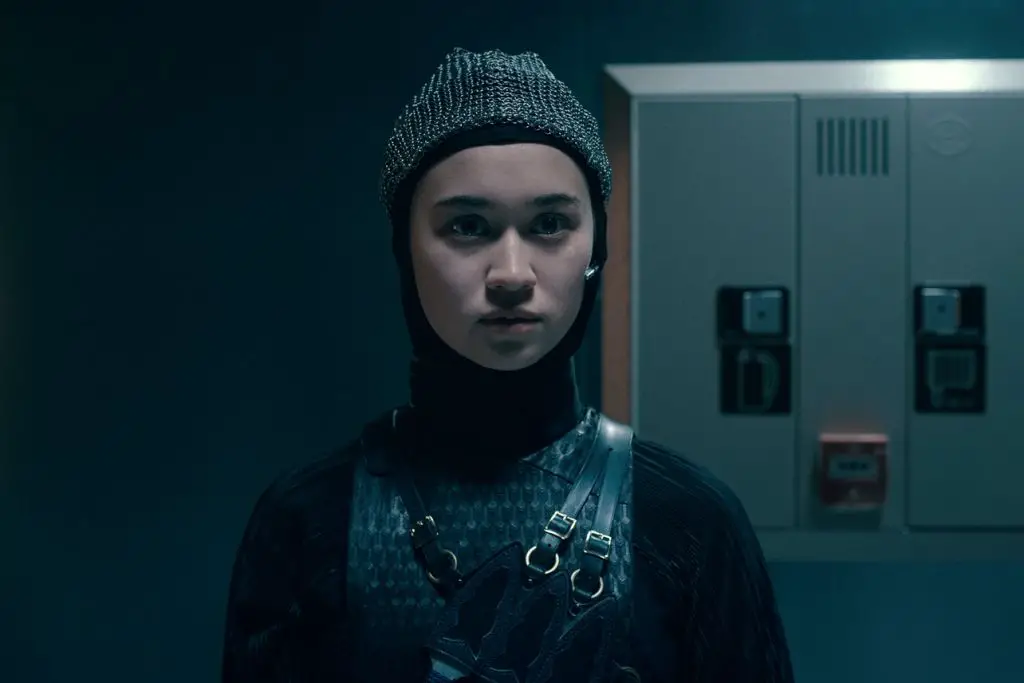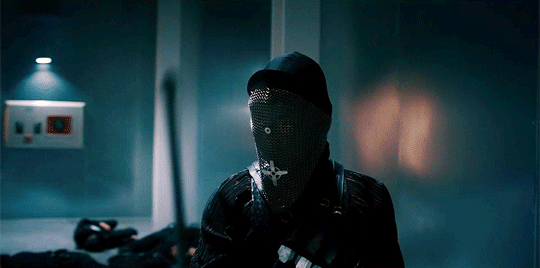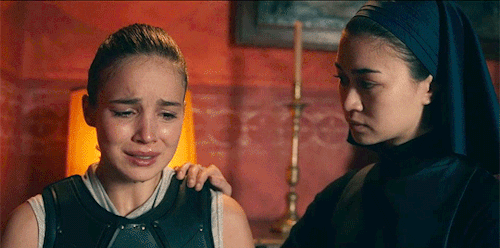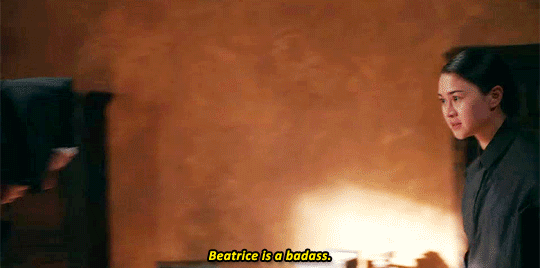- Warrior Nun Struggles As a Trauma Narrative (Part 1)
- Warrior Nun Struggles As a Trauma Narrative (Part 2)
- Warrior Nun Struggles As a Trauma Narrative (Part 3)
- Warrior Nun Struggles As a Trauma Narrative (Part 4)
- Warrior Nun Struggles As a Trauma Narrative (Part 5)
Content warning: discussions of child abuse
Spoiler Warning for Warrior Nun
Introduction:
Welcome back to my series on Warrior Nun (Part 1 and Part 2) and its handling of Ava’s traumas! Today I will be discussing Ava’s relationship with Sister Beatrice. In a later piece, I will wrap up this series by her relationship with Shotgun Mary. These two fan favorites shined this premiere season, and their character complexities deepen in the context of ‘non-survivor-privilege’.
As I laid out in my first article on non-survivor privilege, the problem does not lie in the fact that abuse is being shown in general. (If you need to brush up on the topic of ‘non-survivor privilege’, you can check it out here.) It’s in the fact that storytellers show abuse without discussing its effects on the characters, treating them like unnecessary punching bags and subjecting the audience to potentially triggering material, while these same storytellers are bolstered by a history of pop culture downplaying abuse. So such cultural baggage casts a shadow over any property that might include storylines about trauma and abuse, because there’s the concern that there won’t be follow-up and weight given to the trauma.
Non-survivor privilege filters through Beatrice and Mary and how they perceive Ava because the characters who should be most sympathetic to her situation instead parrot the OCS’s unfounded criticisms, particularly Beatrice. It takes some time before they approach Ava as not a ‘selfish’ outsider but as an uninformed civilian and potential team member. Unsurprisingly they connect to Ava once outside the context of the Cat’s Cradle and to an extent, outside the OCS itself. Though Sister Beatrice and Shotgun Mary treat Ava with more sympathy, their characterization of her as ‘selfish’ and ‘self-centered’ reflects their background in an institution that expects women to sacrifice themselves, body and soul. Such an expectation further alienates Ava from her role as the Warrior Nun, and Mary makes the breakthrough for Ava only when she shows Ava the benefits of community.
For all of Beatrice’s warmth and her bonding with Ava early in Warrior Nun, she makes a few comments that reveal a certain level of privilege and undermines her attempts to connect with Ava.

Warrior Nun and Well-Meaners:
In terms of non-survivor privilege, Beatrice embodies a specific type of character one encounters when dealing with trauma and the aftermath of abuse, what I will call the well-meaner. Realistically, there are and have always been people who can relate to a target’s situation, who care about the target, and want to help her, even while they are embedded in the abusive institution. Not all people act aggressive and accusatory like Sister Lilith or Mother Superion. That being said, well-meaners instead undermine the target through misunderstanding, because fully supporting the target means taking sides and partially because that requires well-meaners to side against the powers that enabled the abuse — the perpetrator and related institution.
Again, to be clear, I am not saying that the Sisters are bad people. I am just reiterating that they fall into a pattern of behavior when it comes to long-term abuse and targets who refuse to accept the culture of silent acquiescence. Whether systemic or interpersonal or even both, well-meaners want to help but they approach the situation as if there was never a violation of agency, that the target’s ‘inordinary’ reactions are coming from ordinary conflicts rather than harm and exploitation. In her book Freedom: My Book of Firsts, victim’s advocate and fellow survivor Jaycee Lee Dugard notes, “I think sometimes people ask questions, but they have already formed the answers in their heads and cannot hear anything else,” (p. 185). No one in the OCS even went so far as to ask Ava about her past, and similarly, the Sisters locked her out.
These issues manifest differently between Beatrice and Mary and their approach to Ava due to the flavor of their personalities and their differing backgrounds. And it should be mentioned that some of their hardness comes from the fact that they’re grieving the previous Warrior Nun, Shannon Masters. Shannon mentored Beatrice, as she mentored all the novices, and she was a close friend of Mary’s. (The subtext for ‘gal pals’ being so strong that Sappho might as well have shown up.) We see these issues with Beatrice in 1×03 and with Mary in 1×06 respectively.
I covered Episode 1×03, ‘Ephesians 6:11’, in my previous Warrior Nun piece, but I am revisiting it again so as to focus on Beatrice. (I will also revisit 1×03 in detail in my next piece as I address the systemic problems overall in the Order of the Cruciform Sword (OCS), before I focus on Shotgun Mary.)
Ice Ice Bae-a-trice:
From when we first meet her in 1×01, Beatrice presents herself as a dangerously competent warrior who relies on her intellect and her devotion to the mission to carry her through. (Throughout the Ladies First episode on Warrior Nun, Kori repeatedly refers to Beatrice as ‘emotionally constipated’.) Shotgun Mary even expresses outrage at Beatrice’s cold affect as the group reels from Shannon’s death. In my last article, I described Ava’s trauma response as a flight-freeze hybrid, the former manifested in her intellectual pursuits, like Jillian Salvus’s science, and in her racing thoughts. I think Beatrice developed a similar flight response, except rather than protecting herself through humor and pointed wit, she channeled her intellect into an indefatigable, industrious personality, becoming so skillful that she made herself indispensable to whatever environment she found herself in. As she tells Ava at one point, she “became skilled in so many things so that [she’d] still have value[.]”
In 1×03, after trying to comfort Ava, Beatrice tells Ava that her parents are “conservative” diplomats in England who sent her to Catholic school when she wouldn’t conform to their worldview. She stresses that they are “concerned about appearances.” That throwaway detail about appearances goes to the core of Beatrice’s coping mechanisms. She elaborates, “I wasn’t falling into line, so they shipped me off to Catholic boarding school.” Continuing with the theme of appearance and exteriority, her parents push her out of sight as punishment when they cannot contain her “flaws.”
These “flaws” center around Beatrice being queer, as she reveals to Ava in 1×08. And understandably, Beatrice developed subtle, secretive forms of rebellion so as to balance her front-facing responsibilities to authority alongside her “flaws.” For example, Beatrice bonds with Ava over Mother Superion’s harsh treatment by revealing that she started the trend of referring to Mother Superion as “Cruella de Jesus,” with the implication that this is a nickname the Sisters use behind their matriarch’s back. Clearly, she and Ava share a sense of humor, later bonding over puns in the penultimate episode. Beatrice however shows off her mischievous side to those she trusts, and this complements Ava’s puppy-dog energy, who directly rebels through jokes.
While Ava’s childhood traumas center around immobility physically and psychologically, trapped in an abusive orphanage, Beatrice’s issues originate in rejection from various communities such as her family and to an extent, the Church, due to its history and stance regarding gender and queerness.
In her article on Sister Beatrice, Alejandra discussed the character’s various forms of guilt in relation to her sense of duty and to scars from homophobia. We do not know the extent of her parents’ mistreatment, but we definitely see that it negatively affected Beatrice, contributing to her struggles with self-esteem. Trauma expert Judith Herman describes a dual self that develops in abused children, and in my opinion, her notes resonate with Beatrice:
“This malignant sense of inner badness is often camouflaged by the abused child’s persistent attempts to be good. In the effort to placate her abusers, the child victim often becomes a superb performer. She attempts to do whatever is required of her. […] In adult life, this prematurely forced competence may lead to considerable occupational success. None of her achievements in the world redound to her credit, however, for she usually perceives her performing self as in authentic and false.” (p. 105)
Because she grew up embedded in politics, her parents must have raised her to accept complexities in organizations and in people, and taught her, conversely, that acceptance comes at the expense of her authentic self. Beatrice did not rebel through radical self-acceptance and self-display as Ava did. Indeed, her ability to speak and translate several languages, slipping into whatever tongue the situation requires, functions as a powerful metaphor for Beatrice’s adaptability as an expression of self-preservation.
Her and Ava’s conversation about her history closes with Ava gently prodding, revealing her intuitive gifts as she says, “There’s more to it than you’re telling.” Up to this point, Beatrice had been standing next to Ava, the two women often sharing direct eye contact, but she quietly steps back onto the stairs behind them. She literally steps into the shadows and quips, “There’s always more.” She symbolically closets herself in this moment and ‘ships herself off’ from vulnerability. Like a glacier, Beatrice’s depth lurks below a cool surface, the nun’s habit and headpiece a protective, structural role for her to assimilate into.
Stumbling to the Warmth of Avatrice:
Regarding Avatrice, in my opinion, the writers should address Beatrice’s reduction of Ava in 1×03 so as to be as satisfying as possible. Those interactions are part of their dynamic and the overall story. Beatrice pushes her grief onto Ava without ever acknowledging Ava’s hardships, projecting her experiences with the Church onto Ava. They share two intimate scenes together, Beatrice the warmest and most understanding Sister to Ava so far. That being said, Beatrice makes some comments that undermine her attempts all the same.
While they saw each other in the previous episode, 1×03 marks the first time they meet as individuals and without a Tarask demon getting in the way. After a disastrous sparring practice with Sister Lilith, Ava starts the next scene experiencing a form of middle school shunning, standing in the dining hall with a full tray and no welcoming look from the nuns. When she walks over to a bench, two nuns actually get up and walk away, leaving a large space next to Beatrice.
Ava thinks in voiceover, “No smile, unreadable expression, not actively hostile — I can work with that.” She is evaluating Beatrice’s potential as a friend and ally, in comparison to the rest of the OCS that she’s dealt with so far. After a tense beginning, Beatrice put off by Ava’s unassailable humor, she opens up slightly, moved by Ava’s recognition that the Order is grieving Shannon. Ava understands why it is difficult for the OCS to accept another Warrior Nun at this time.
Beatrice describes Shannon as initially cold and intense, later warming up as she grew into a supportive mentor to newer Sisters like Beatrice. In this moment, Beatrice might as well be describing herself and the supportive person she becomes for Ava late in the season. Beatrice also reveals her commitment to the Church’s code of silence and her ability to conform to authority. After Ava mentions that the Church and by extension the OCS are not who she is, Beatrice replies, “We all have a past, Ava. Secrets that are ours alone. But none of that matters once you realize that not everything is about you.”
Well Beatrice, maybe if you willingly choose to join this order instead of being kidnapped and coerced, you can feel like you belong.
In this one line, Beatrice demonstrates why the OCS failed Ava: the assumptions about her faith, the history of dehumanization, and weaponization embedded into the Warrior Nun tradition. Ava’s needs and voice would not be prioritized by anyone at the Cat’s Cradle, which Beatrice compounded in her attempts to comfort Ava after the incident with Mother Superion (more on that later). Here non-survivor privilege comes into play.
When it comes to community and to institutions, Beatrice is more invested in these power structures, because she has experienced the good that they can do and because she has rediscovered a family in the OCS. Of course, Beatrice’s relationship with the Catholic Church is complex, as she felt compelled to join to save her “eternal soul,” and she joined at a young age. Having been rejected by her family of origin, she found refuge in the OCS, but this belonging came with pain clearly labeled on the price tag. The Church does not have the best track record with respecting women and queer people.
That being said, Beatrice has more power than Ava in this scene because she belongs to the OCS and because she bears some responsibility for Ava’s situation. In her essay on non-survivor privilege, Jennifer Kesler writes, “We know you have a culturally-granted privilege to remain ignorant. To not know, and therefore not to be responsible. Not to bother. Not to think about it.” Beatrice brushes off Ava’s discomfort because acknowledging that discomfort would require her to admit culpability in kidnapping Ava.
Later, Mother Superion accuses Ava of having committed suicide before the halo resurrected her. Pushed to tears, Ava repeatedly asserts that she did not kill herself, eventually crumbling and turning into Beatrice’s arms. Ava’s next scene decompresses that intense moment as she and Beatrice further bond. This is the scene in which Beatrice eventually reveals a little of her backstory. In this later scene, Ava dejectedly says, “No one believes me anyway,” in reference to her assertion that she didn’t kill herself. Beatrice’s attempts at comfort include the sentiment, “I think you’re thoughtless and self-centered. But dishonest? [No.]”. For Beatrice at this point, she tends to place the institution before the individual because serving the institution has meant having a purpose, a job, serving a higher power.
It is only when the OCS undergoes further reshuffling, as Cardinal Duretti begins to dismantle the organization’s legacy and banishes Beatrice, Father Vincent, and Mary because of their conflicting loyalties, does she confront her relationship with authority. That happens in 1×07, and the pivotal montage in the episode includes Beatrice sitting at a bus stop, contemplating what to do. In that moment she faces the predicament of staying true to her vows and to the Church or risking her ‘eternal soul’ for her loved ones. The people who have actually shown up for her. I believe that this moment is more important for Beatrice than meets the eye. Her being transferred to another convent, and thus being removed from the OCS for a perceived ‘flaw’ i.e. her lack of loyalty to Duretti, likely reminded her of her parents sending her away to boarding school. Having lost two of her Sisters already, she refuses to lose anyone else in her chosen family, and she refuses to be shipped off anymore when she does not reshape herself to another person’s will.
That is not to say that before this moment Beatrice followed the Church without question and conformed to whatever an authorial man in a white or red dress dictates. As she tells Cardinal Duretti earlier in 1×07, “You may always count on me to remain faithful. To God.” Rather, as the archetypal institutional scholar, Beatrice fits herself well into the Church’s structure. And, as a queer woman of color who came from a privileged yet demanding family, she became a chameleon. From what we’ve seen of her, Beatrice shields herself through intellectualization and utility. She and Ava differ in that way. And thus, her choice in 1×07 is key to Ava being able to erode her defenses the following episode. As Alejandra put it succinctly, Beatrice embodies the Dutiful Princess trope: “she has renounced a duty she had sought out, so quickly locates and acquires a new one: Ava. Beatrice needs a purpose, you see.”
While Beatrice could mask herself well enough so she could assimilate into whatever community she belonged to, such as that of her family, Ava had no chance of being seen as ‘valuable’ in the eyes of the Church and in the eyes of Sister Francis, her caregiver, due to her disability. Ava’s skill set lies in her resilient personality. We see all of this in action during the pinnacle Avatrice scene. In 1×08, after reading about a lesbian Warrior Nun, she comes out to Ava, implying that growing up she suffered from homophobia. Their subsequent exchange highlights how they fulfill different emotional needs for one another:
Ava: “Don’t hate what you are. What you are is beautiful. I’m sorry for your pain.”
Beatrice: “Don’t be. Because now we get to tap into yours.”
They are both adaptable but in complementary ways, and Beatrice’s commitment to ‘fitting in’ keeps her from truly engaging with Ava early in the season, as she cannot comprehend yet a reason for Ava’s reluctance to belong. Ava, on the other hand, knows that no matter how much one may try to fit in, sometimes the effort goes unacknowledged. She values authenticity over comfort. Once Beatrice chooses individuals over the mission, she devotes time and energy to Ava in a way that Ava has never experienced before. She also pushes Ava to grow that reflects how she respects Ava’s agency. Ava, on the other hand, accepts her so unabashedly that Beatrice can let go, period. So, while I think Beatrice will be a safe place for Ava to land and to experience the messiness of life with, Ava will be the catalyst for Beatrice to grow and to cast aside her Ice Queen persona for good.
Conclusion — Some Thoughts on Fandom:
With all of that in mind, her backstory makes her more accessible to the audience and that relatability can affect fandom discourse and interpretation. I have noticed a tendency in fandom, regardless of the story, that when there is a potential sapphic ship and the characters’ backstories include themes of homophobia and other types of abuse, fans hyperfocus on the trauma of homophobia while ignoring and/downplaying the effects of those other forms abuse. Some of this stems from the fact that, in my opinion, certain fans come from abusive homes and do not want to engage with themes of abuse because they are not ready to process childhood trauma. And in a world predicated on non-survivor privilege, audiences, in general, do not want to consider the full realities and implications of Ava’s backstory. The audience, especially queer viewers, more immediately recognize Beatrice’s homophobia-born trauma as trauma rather than Ava’s, because Ava’s is so dark and disquieting.
People, generally speaking, also tend to picture trauma manifesting in very specific ways, especially when that character is not white, male, and straight, as marginalization constricts the emotions a person can publicly express. So, Beatrice gets more fandom sympathy because her backstory is immediately more accessible and because she is cold and guarded in a way that people read as the ‘correct’ response to hardship. On Ladies First, Kori suggested that Sister Francis return as a demon or zombie (t. 48:47), and I think a zombie!Francis could be used as a visceral metaphor for triggers and the affecting presence of trauma. Beatrice and the audience could see Ava react to her abuser: Sister Francis’s return would be a catalyst for Ava to discuss her past now that she has found belonging.
Overall, non-survivor privilege includes how we portray trauma in the media and how we subsequently discuss it. I hope that this piece, and the overall Warrior Nun series, will have our readers reevaluate the ways that they consider portrayals of trauma in media and how they relate to it. And to be clear, I am not saying that people should not relate to Beatrice’s trauma nor am I saying that trauma from queerphobia of any kind cannot be scarring.
Rather, I think that traumas of all kinds share similarities in symptoms, in how they are perpetuated by abusers at different levels of society. (And I’ll be exploring some of that next time.) In fact, when Beatrice came out as queer and discussed being persecuted, her monologue resonated with me because interpersonal trauma, no matter what kind, pushes the survivor to change themselves. It did not matter that the writers were implying homophobia in the context of the scene. As I mentioned earlier, writings on abused children can apply to survivors of general childhood traumas, and that includes the performativity born from shame.
How Beatrice was forced to reinvent herself in order to gain societal acceptance, how she must have been shunned by others who sided with her parents and with a bigoted society over her, that isolation is better understood when one understands non-survivor privilege. Warrior Nun has had some missteps with its first season in regards to depicting trauma, but with how well the show and Kristina Tonteri-Young have portrayed Sister Beatrice, and with how rich Avatrice already is a ship, I have my hopes for this show.
Images courtesy of Netflix
Have strong thoughts about this piece you need to share? Or maybe there’s something else on your mind you’re wanting to talk about with fellow Fandomentals? Head on over to our Community server to join in the conversation!






